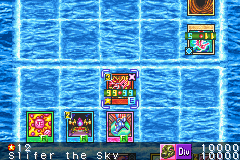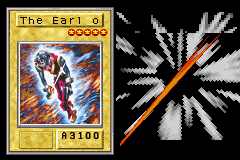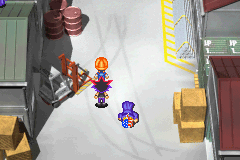Yu-Gi-Oh! - The Sacred Cards Review by: Skilledtree - 6/10
Yu-Gi-Oh! The Sacred Cards - Skilled ReviewYu-Gi-Oh - The Sacred Cards: Review
Pre-ReviewTo start off this review, I wanted to share with everyone that this play through was the first time I had ever touched Yu-Gi-Oh: The Sacred Cards. When judging all aspects of the game, I took into account the year of release and what other games were doing at this time. I believe that this will make the following review fair and honest. For a video version of this review, please check the Vizzed Videos section of Yu-Gi-Oh: The Sacred Cards.
GraphicsThe graphics presented in this game are interesting. The game world is small, and so I expect a bit more detail than a larger game. To start off, the sprites used while walking around are above average. The game world textures are well done. I really liked the animated cut scene-ish dialogue where the character you are talking to is shown. They do really neat things like the character blinking. During the dueling sequences, I found it to be a mixed bag. The detail of the playing field, card background, and UI to be somewhat unappealing. However, the card portrait were of high detail when you zoomed in on them. The many different card types and subtypes are easily distinguishable though, so credit must be applied there.
SoundI noticed many different background music being played at different times in-game. The background music was different, fitting of the situation, and most importantly it was good. The sounds may be average, but the music was just really good. Most notably, I really liked some of the "boss" type music played. It really added to the immersive feel - which is impressive being I am usually very hard to impress with sound and music.
AddictivenessThis is where things get complicated for me. The game starts out noticeably easy, and for about 10-15 duels you have virtually no trouble winning. Luckily, the game ramps up in difficulty, but not in the way you'd expect. The game fails to inform you that there is a weakness system in place, giving you quite the curve ball when you're wondering why a weak monster just totally wrecked your obviously superior awesomely amazing monster. Then you learn the system, and all of a sudden it's back to the start of beating everything. Then they get very good cards, which leads you into checking out the card shop. You'll eventually buy those trap cards you totally ignored, and realise they are 100% game breaking. You will win about 95% of your future duels just off of using trap cards. So, with all this being said, the broken trap card system makes the game way too easy, and makes you think about almost nothing. It makes for a dull, checkers like experience in what is supposed to be an interesting, chess like experience.
DepthIn-terms of story related depth, the game breaks up the story a bit too much, and because of such it really doesn't have too much depth. Game play depth however is of a large amount. The game, even though it never tells you basically anything in terms of anything, does have a lot of different things to think about. One of the early things you may run into is that you have a duelist level. I strongly feel that this should never have been implemented - it just doesn't seem to fit into a card game. The duelist level is a variable that goes up whenever you beat an opposing duelist and allows you to use higher cost cards. On top of this, another thing that may catch the newcomer off guard is the deck limit system. When you defeat duelists, you will also be rewarded with more deck limit points. This variable allows you to put more good cards into your deck. I sort of see why this was implemented to prevent insanely over powered decks, but at the same time trap cards require a very small amount of cost to use. Balance in this regard was not done well at all, and it becomes more annoying than anything. I can only come to the conclusion that these systems were implemented to artificially boost play time by convincing the player to repeatedly duel the same person over and over - which is largely unappealing when you can just use their weakness and destroy them in about two minutes with no chance of losing.
In a possibly more positive light, the curve ball weakness system was pretty fun once I understood what was actually going on. There are many different types of cards that will instantly destroy a certain other type of card. It's not a small boost, or even a big boost, it's just a flat-rate instant destruction system. I personally think they should have done something like +500/-500 for strength/weakness, but they chose to go all-out destruction. Once you get the hang of it, you start to realise that the weak cards you start out with can potentially destroy anyone if you correctly guess what they will use. The system, although extreme, is fun and could have been a very strategically impressive asset. The problem is, you learn quick that after a certain point in the game, all you need is Light and Thunder cards, and maybe a few spell casters. Since the opponents never change their decks, overall replayabilty is limited, and deck construction leans less toward your creativity, and more toward winning potential of weakness/strength. Plus, trap cards are still going to be better than anything else, and you'll end up stuffing your deck with at the very least nine.
StoryOkay, so let's talk about the story. If you're playing for the first time and you don't know where to go, who to duel, or what specific thing to do - the story becomes split and hard to follow at times. Essentially, you and your good pals Yugi and Joey are trying to make it into the tournament being sponsored by Kiaba. You must find 6 Locator cards by defeating main characters from the Yu-Gi-Oh TV series. Along the way you'll run into a few mysterious bumps in the road, and you'll ultimately end up going on to make it with both Joey and Yugi. You'll learn of the origins of the duel monsters, and will figure out who the mysterious bad guy is. That's about as far as I can go without spoilers, and there's not much more than that. The story is pretty mediocre. It's not bad, but it's nothing to write home about. Perhaps a little more meat, and maybe less confusing direction overall, would have helped the story really shine brighter.
DifficultyThe difficulty of this game is honestly way too easy. I came into this game expecting a thinking game, and was disappointed to learn that a few things are very easily abused. The penalty system for losing a duel is to lose the card you gambled (Which you learn early on that a card with 500+ ATK gives you high ante). It doesn't feel all that penalizing, all told. The hardest part of the game was learning things that shouldn't be hard. For instance, learning the controls, learning where to go for the story, learning the weakness and strength system, learning that there even was such a system, figuring out that you can't use that card because the game said so until you duel your heart out against easy-to-beat opponents, learning how to navigate the duel interface when starting the game, and accidentally stumbling upon the fact that you can sort cards to make your life way easier.
Basically, the hardest part of the game should have been the easiest. The trap card abuse makes the dueling entirely too easy, and a no-thought-required situation most times. The only trouble I truly had after getting trap cards was the final duel - because he used a card that wiped all my trap cards. I came back two minutes later and destroyed him quickly though, so basically it was luck that had defeated me. When the two hardest things are the User Interface and the Luck system, you're either playing XCOM or you're being slightly disappointed.
In Conclusion: Summarization and RatingsLet's brush over some of what I said and what I rate each of these categories.
The graphics presented above average sprites and well done textures. The battle screen is slightly unappealing, though the card portrait detail felt good. The minor animations on the sort-of-cut-scene scenes was a very nice addition. So, with that being said, though I found the battle graphics a bit lacking, the other things mentioned really pull the weight and land a nine out of ten.
Graphics: 9/10
The music in-game was fantastic. I'm hard to please with music, and I felt that they did an excellent job. The non-music sounds were about what I expected, but the immresive and overall mood-boosting music delivers this game a sound score of ten out of ten.
Sound: 10/10
With a nine out of ten and a ten out of ten, I'm sure we both were wishing that the happy-train couldn't end. Sadly, it has, and it starts with the addictiveness just not showing up at the train's boarding station. The game had a large amount of potential to deliver a highly addictive battle system. It falls short with the unbalanced card types and forced artificial time boosting mechanics. I simply do not think I could convince myself to do another play through, knowing that trap cards destroy all. Seriously, it's that game breaking for me, and this probably won't be the last time I talk about it in the closing of this review. Due to these reasons, I'm a little upset that I have to rate the addictiveness a five out of ten.
Addictiveness: 5/10
To summarize the depth, there's a lot more bad depth than good depth. We can start positive, though. The strength/weakness system, although unexplained and surprising, is pretty cool once you get used to it. It adds more of a thinking element into the game. Well, at least it could have, if you didn't always know what you were up against. Artificial time boosters, easy-to-abuse strength/weakness system, and the balancing of trap cards are entirely too difficult to overlook. The story related depth wasn't anything worth bragging about either. For these reasons, I would hover anywhere from a four to a six out of ten. Since the trap cards really do break all thinking involved, it's landing at a four. It possibly could have gone lower, but I appreciate the attempt at a strength/weakness system enough to not go any lower.
Depth: 4/10
The story is confusing. Not because it was written bad, but because of the poorly designed way of actually advancing in it. The first half of the game has not much meat on the bone in terms of story. Collect locator cards, get into the tournament. The second half begins to spice up the game though, and offers some lore on the cards. The well done animated cut scene-ish scenes and music really boosted the immersion into the story though, so the good graphics and music successfully boosted the truth-be-told mediocre story from a six to a seven out of ten.
Story: 7/10
The game is easy. Not by design, but because of the broken trap card system, and predictable opponent decks. I highly recommend against using a guide, as it would most likely make the game even easier than what I have come to find. If you choose to not use trap cards, or not use the strength/weakness system to your advantage, then you may actually find a bit more challenge! Dominos, the in-game currency, felt like it was given away like candy. I don't know how you could spend it all. With all this being said, and staring straight at trap cards while I say it, I rate the difficulty a two our of ten. It truly breaks my heart to say that, because I full-heartedly wanted it to be a thinking game, not a go-through-the-motions game.
Difficulty: 2/10
So what did I think overall? I think trap cards ruined the game for me. I respect an easy game when its intentions were clearly to be easy. This game was not intended to be easy, and therefore I am upset that it is. The story is decent, maybe even above average compared to other games in this time frame. The game's good amount of depth is entirely erased by the abusable systems. The sound and graphics are great, and I loved that they put the effort into those. Let's be honest, this game deserves a higher score than what I'm about to give it, but it ultimately failed to balance the card system - and in a card game that's obviously not a good thing. I give the game a six out of ten, and I hope that if I review the other Yu-Gi-Oh games that they will offer better balance.
Overall: 6/10 (All scores combined: 6.2 - I deducted .2 due to game breaking balance issue)If you plan to play this game, resist the urge to fill your deck with trap cards. Avoid guides telling you what every duelist will use, and you may still find enjoyment. I'd say the game is worth playing for a play-through, but I don't think it's a game you will play for maybe two play-throughs. Thanks for reading!
Graphics
9 Sound
10 Addictive
5 Depth
4 Story
7 Difficulty
2


 User Notice
User Notice 






































![Yu-Gi-Oh! - The Sacred Cards - Yu-Gi-Oh The Sacred cards [Complete Play] - User video](https://i.ytimg.com/vi/V_RvfoaWBhs/mqdefault.jpg)
